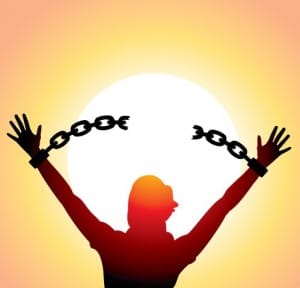
One of my major turning points on the road to healing was coming to terms with the unconscious streaks I had taken on at a young age. When, reading the latest findings in neuroscience, I discovered that such programmes guide us through life – they alone are thought to have only about five per cent of the influence in directing events, according to Dr Bruce Lipton – I decided to confront them.
I have resisted this step for many years. Whenever I thought about it, a kind of apathy or indifference came over me. I assumed that the lack of charge at the thought of unconscious programmes and youthful experiences meant that I was already done with them or had them sorted out.
In reality, I just repressed the unpleasant memories and moved away from them. But this did not limit their action – they were still very active and guided me through the experience.
I immediately set to work.
A youthful experience that deeply marked me

Through a special process based on tracking emotions, I was transported back to my youth. I realised that, in a negative sense, I was most affected by a feeling of helplessness. I remembered some events that made me feel powerless, despite my great desire to act.
The memory that I felt the strongest charge about was the building of the house. I was eleven or twelve years old. One day, when the whole family went to the house, we came across a huge pile of earth on the way, which completely covered the road and blocked our access. We also noticed that a neighbour was digging a hole for a garage. We started dumping the soil – in fact, my uncle was dumping it right outside our neighbour’s front door – and she called the authorities.
The police arrived. My grandfather was taken to prison, where he spent the night, and my father, who was retired on disability, and even my seriously ill grandmother, were physically attacked. But I could only watch helplessly.
This memory triggered such a violent reaction in me that I started shaking all over and crying like rain. I felt an infinite love for my father, even though he was not the ideal parent that any child would want.
When I thought about the situations in which I experience a feeling of helplessness today, I realised that along with this feeling, I always experience a specific, always the same health problem.
The memory that I had uncovered, which I had apparently tucked away somewhere deep so that it did not get in the way of my life, also revealed to me why I later began to hunger for money and power. I wanted to make sure that I would never again be a helpless bystander, but would have enough influence and money to solve problems.
From the same impulse, I started martial arts training and weight training to strengthen my body. This was my ticket to liberation: I wanted to become so physically strong and so powerful and so rich that I could gain the strength to protect myself and those around me at any moment.
My decision to follow this path was also influenced by what was happening at school, where I was often the target of ridicule and a convenient punching bag for my stronger peers who I didn’t dare and didn’t know how to stand up to.
No wonder I became a warrior and a successful but strict businessman. Strict, above all, with myself …
How I changed an ingrained unconscious belief

Once I realised this really powerful memory and released the accumulated tension, I got to work. First, I put myself in the role of an observer, sending light into that period of time. I had neither the event in mind, nor the rest of my memories of that time, because the very association of the event awakened a reaction in me, and I was instantly plunged into a whirlpool of strong emotions.
So I just thought I was sending light into everything that was happening to me around those years.
After a while, I was able to step back and ask myself what it had been like a day or two before the event, when everything was still fine, or when there was no indication that anything special was going to happen.
Then I put myself in my mind in the day after the whole situation was resolved, or in the third day after the drama. Life was back on track and nothing resembled the previous experience. Even the pile of earth was gone.
When I could recall these two ordinary days and experience them through completely neutral emotions, I began to sendlight into the time between them. This signalled to the subconscious that I perceived the in-between time as something mundane: after the normal day (the day before), things were back on track and life went on as usual (three days after). So nothing critical had happened in the meantime.
The next step was to see the situation through the eyes of all the participants. This part was the hardest for me, but it was crucial for progress.
In my mind, I put myself in the shoes of a neighbour who had dug up the soil. I asked myself what had motivated her to act, or where the idea had come from.
I realised that she was only reacting to a situation, not that she deliberately wanted to harm our family. I would have done the same if any other family had been in our shoes. (Incidentally, the root cause of the whole problem was a bureaucratic error which resulted in the neighbour becoming the owner of the road to our plot. So she was actually driving the earth onto her own land.)
I understood it somehow, so I did not condemn it.
Then I put myself in the shoes of the police. I imagined them coming to an unknown family with a warrant. The order is based on real facts, according to which they have to deal with the situation. When I imagined how they perceived their job – they were the power and the authority to ensure order on the basis of a report – it became more or less clear to me why they had sided with the neighbour. The defiance of the authorities and the long tongues of our family, however, were a drop over the edge. The consequences that followed were inevitable.
By playing out situations like this through the eyes of all the participants, I actually found the strength to forgive.

At this stage, I also used a special technique called addition-elimination. I also recalled some other, more or less neutral, memories from that period. When I put them side by side with this experience, they all seemed to me to have about the same significance and energy. In the sense of, it happened, it was interesting, and today is a new day.
Then I moved on to the next phase of the exercise. I imagined that something completely different, neutral or even pleasant had happened that day. I didn’t imagine a pile of earth or policemen, but a normal summer day.
I then put that day in the context of the day before and the third day after the event, which I had already consolidated and accepted as quite normal. I went through all these days in my mind and realised that they were similar in content and in charge.
I stayed at this stage for quite some time until I was able to do the last part of the exercise: I could remember all the events as they actually happened, but I did not experience any strong emotions about them.
Even though I imagined some unpleasant shots, I experienced it as if it were happening on a movie screen, or as if it were happening to someone else. The picture was becoming more and more cloudy, blurry, somehow distant and without charge. Eventually I even began to wonder why I was thinking so much about this situation, because it was nothing special.
So I took away the charge and the meaning from the memory, and with it the power it had over me. Because I have been able to accept what happened exactly as it really happened, I do not feel the need now to repress, cover up or distort anything. Therefore, this memory no longer causes me internal stress.
I know that I have indeed resolved this trauma, because whenever I think of my neighbour, of that event and of all the associations connected with it, I don’t feel any particular charge, but I perceive things as normal, neutral.
It also helped to ask what I value and respect in a neighbour. Then, whenever I thought about her, I consciously called up these feelings. Over time, I automatically began to associate my neighbour with her positive qualities.
Later, I discovered another, simple technique to check whether I have really forgiven a person.When someone mentions and criticises a person during a conversation, I monitor my feelings. If I find myself wanting to lighten up, to join in the criticism, or if I somehow agree with the interlocutor, it means that I have not yet forgiven. This also includes veiled criticism, in the sense of, “Ah, let’s leave her alone, life will punish her” and so on.
When I truly forgive, I start to defend the person who has been attacked in a way: ‘They did the best they could at the time, so they are not a bad person.’ Why are you being so hard on her?” Such and similar thoughts overwhelm me. In short, I find myself taking her side wholeheartedly when she is attacked. This is a clear sign that I do not hold a grudge against her.
A strategy to tackle limiting unconscious patterns

This exercise was the model I used to deal with my past.
Over time, I have come to realise that a memory or an event has only as much power over me as the deep meaning I attach to it. Or, to put it another way, to the extent of my outrage at the situation, or how strong my (unpleasant) feelings towards it might be.
The more I repeated these exercises, the clearer it became that it was up to me to decide whether an event would make a mark on me , or whether I would merely place it among the memories of my youth, lost among the rest.
However, I was always careful to do these exercises only when I was in a stable condition. Once I started digging into the past when I was very sad, and then I felt sick all day.
I did not search endlessly for unpleasant memories. I collected eight of them, then reprogrammed them in a similar way to the one I did with the heap of earth.
Since then, I have been encountering the past by mentally walking along a timeline, starting from my earliest memory, and pausing for a moment at the most important turning points. With a changed view of these eight key situations, and at the same time recalling many of the remaining, pleasant events, I repeatedly revive and consolidate a neutral or pleasant view of my youth.
In fact, the whole exercise now seems to be about paying attention to emotions and body sensations as I spin a film in my head, in which I walk from my youth to the present day. If I don’t get any unusual sensations and if I don’t feel any tension in my body, it’s a sign that I’m not experiencing any major blockages at the moment.
Temptation

I have often been tempted to use this technique to reprogram my remaining memories. I decided not to do it, otherwise I could search for and “fix” unpleasant things indefinitely. The more you deal with them, the more you find, the worse you feel and, as a result, the worse you think of yourself.
It works in a similar way to affirmations. You intensify what you mean. What you have in your mind a lot, you tune in to, and slowly it becomes familiar. (Read: if you don’t reminisce about your miserable youth at least a few times every day, or get caught up in some other drama, you’re missing out on something.)
This article is based on the book “The Big Ugly Crisis”, by Boris Vene and Nikola Grubiša.
